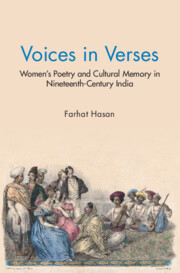Book contents
- Frontmatter
- Dedication
- Contents
- Acknowledgements
- A Note on Transliteration
- List of Abbreviations
- 1 Introduction
- 2 Unravelling the Texts: Memory, Reforms, and Literary Sulh-i-Kul
- 3 Representing an Inclusive Literary Culture: Women Poets in the Bazaars and Kothas
- 4 Representing the Kothas: The Two Sisters in the Literary Sphere
- 5 Commemorating Women Poets: Memory, Gender, and the Literary Culture in the Persianate World
- 6 Secluded Poets in Literary Spaces: Memorializing Female Rulers, Consorts, and Memsahibs
- 7 Conclusion
- Glossary
- Bibliography
- Index
2 - Unravelling the Texts: Memory, Reforms, and Literary Sulh-i-Kul
Published online by Cambridge University Press: 06 March 2024
- Frontmatter
- Dedication
- Contents
- Acknowledgements
- A Note on Transliteration
- List of Abbreviations
- 1 Introduction
- 2 Unravelling the Texts: Memory, Reforms, and Literary Sulh-i-Kul
- 3 Representing an Inclusive Literary Culture: Women Poets in the Bazaars and Kothas
- 4 Representing the Kothas: The Two Sisters in the Literary Sphere
- 5 Commemorating Women Poets: Memory, Gender, and the Literary Culture in the Persianate World
- 6 Secluded Poets in Literary Spaces: Memorializing Female Rulers, Consorts, and Memsahibs
- 7 Conclusion
- Glossary
- Bibliography
- Index
Summary
This study has two related ambitions: one is to recover women's poetic compositions, and the other is to see how their participation in the literary sphere was remembered and represented by connoisseurs, critics, and the common folk in the early modern period. In order to do so, it focuses, as discussed earlier, on two biographical compendia (tazkiras) of female poets, both written in the nineteenth century, and this poses several problems before us. For one, we need to understand the implications of recovering women's lyrics from the tazkiras since our access is mediated by the selection, observations, and biographical notes that their authors provide before citing their poetic compositions. In line with the standard format of literary tazkiras followed across the Persianate world, in almost all entries there is a selection of verses, but these are preceded by biographical clips of varying lengths. The question then is: how are these life stories to be read and interpreted, particularly when they purportedly intend to highlight and preserve the contribution of women to the shaping of the literate tradition? Related to this, we need to be attentive to the disciplining thrust in the life stories and the inbuilt exclusions and silences that were integral to the discursive incorporation of women's poems within the early modern literary culture.
Raising the issue of ‘authenticity’ in texts of memorialization only fetches diminishing returns, and it is important to realize that our tazkiras not only carry verses that were ‘authentic’ but also the ones whose genuineness was suspect, but they were still in circulation in commemorative spaces. Not an inconsiderable number of women poets had poetic compilations or diwāns of their own, and when their work is mentioned in the tazkiras, one could be fairly certain about their genuineness. It also happened not infrequently that married men provided to the authors poems composed by their wives; or the tutors, impressed by some of their female students, shared their couplets with them. Even so, our authors also picked up a large amount of their material from gossip and discussions in the markets (bāzār), coffee houses (qahwa-khāne), courtesan's quarters (kotha), and poetic assemblies (mushā ‘ira).
- Type
- Chapter
- Information
- Voices in VersesWomen's Poetry and Cultural Memory in Nineteenth-Century India, pp. 21 - 54Publisher: Cambridge University PressPrint publication year: 2024

